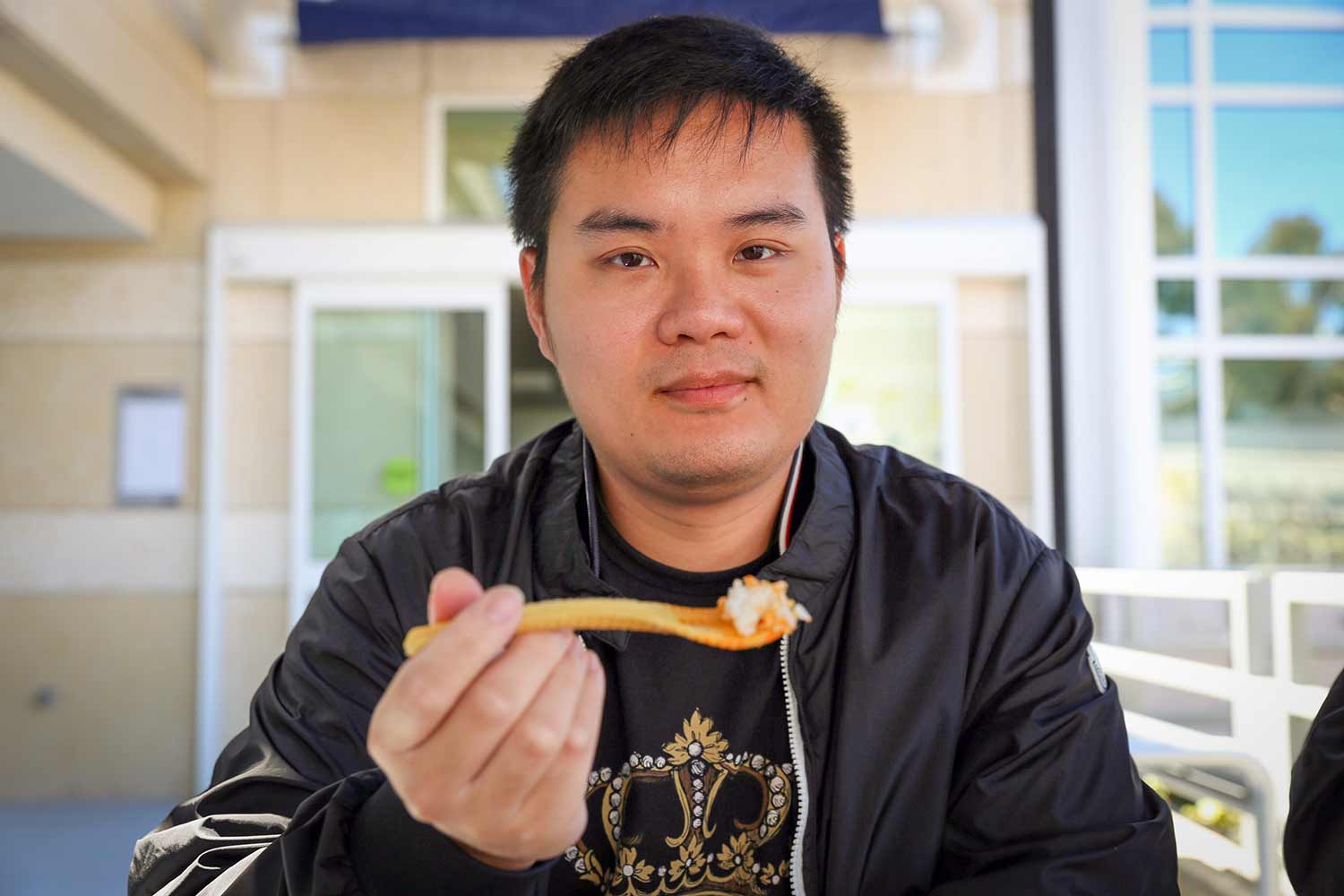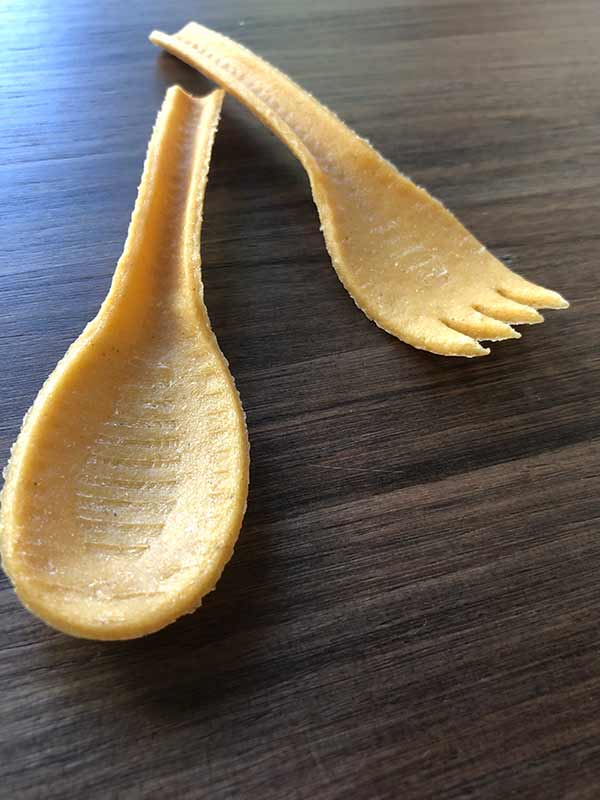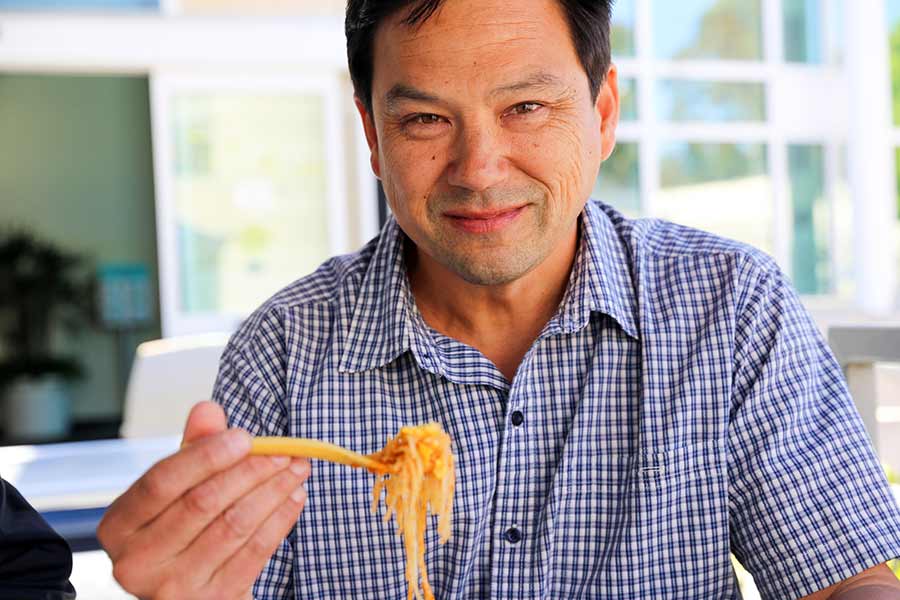
By:
- Katherine Connor
Published Date
By:
- Katherine Connor
Share This:

Zack Kong, a bioengineering alumnus and co-founder of TwentyFiftyFork, takes a bite of hot curry using the compostable cutlery he developed.
You Can Eat That Fork
Alumnus develops durable cutlery that’s compostable and edible
Restaurants in the city of Malibu, CA soon will be banned from using or selling plastic cutlery. Last year, the Indian capital of Delhi banned all plastic bags entirely. These decisions are part of a growing concern about the fact that plastic doesn’t just disappear when it’s thrown in the trash—it can take hundreds of years to decompose, leading to long-term effects on the planet and the creatures that call it home.
From take-away restaurants that can’t send customers off with a metal fork, to military ready-to-eat meals that need to be biodegradable, to hikers trying to skimp on weight and waste—what’s the solution?

The compostable, edible cutlery is made entirely from food products such as wheat flour, corn flour, soybean flour and water.
Several companies and startups have begun marketing biodegradable cutlery to fill this niche, but Zhicong “Zack” Kong, a 2017 bioengineering alumnus from UC San Diego, has created his compostable, durable, edible cutlery that is unique for several reasons: the ingredients, a scalable manufacturing process and an innovative mold technology.
“The idea for edible utensils is originally from a Japanese designer in 2008,” Kong said. “He made conceptual utensils like bowls and chopsticks out of flour. Then the first one to use this concept to actually make functional utensils was a group from India, but they didn’t have a mold that could make the flour-based utensils strong enough to actually use—the utensils kept breaking.”
Enter Kong’s bioengineering expertise. He developed and filed an 80-page patent application with detailed, engineered formulas to make cutlery that was strong enough to actually eat with, yet made entirely from food products so it’s compostable and, in theory, edible. He claims his forks and sporks are currently the only 100 percent compostable alternatives to plastic cutlery, and can withstand temperatures up to 170F. They weigh in at 11 grams each.
Going a step further, Kong developed different formulas for different parts of the globe, taking into account the most common grains and proteins in each locale so as to not require transporting ingredients from far distances and thereby adding to the carbon footprint of the product. Think more rice and soybean in Asia; rice and tapioca in Southeast Asia; algae in Indonesia; wheat, corn and soybean in the U.S.
In addition to the optimized ingredient list, Kong’s mold—also patent-pending— is what allows the cutlery to be entirely food-based, yet still maintain tensile strength.
“A traditional mold is more enclosed with several holes for injection or vacuum sealing,” he said. “My mold is a completely new 3D-printed technology, which allows the utensils to have the shape you’d expect, but still be durable.”

Albert Liu, who is helping Kong launch the compostable cutlery company, chows down on noodles. The fork’s ingredients and unique manufacturing process mean it can maintain tensile strength while only using food products.
Albert Liu, also a UC San Diego alumnus, met Kong through the Institute for the Global Entrepreneur at UC San Diego, and is helping bring the product to market. The duo is calling the compostable cutlery company TwentyFiftyFork, a nod to the date at which it’s anticipated that the amount of plastic in the oceans will exceed the amount of fish.
They launched the product in March 2018 at the Natural Products Expo West in Anaheim, and are working with a manufacturing site in Oceanside, Ca. to ramp up production to 180,000 units a day by 2019. They are already receiving orders from health food stores and food service distributors. A Kickstarter campaign is scheduled for late summer 2018.
While the fork is edible and made only with food products like wheat and corn flour and water, Liu and Kong say their primary aim is to provide a 100 percent compostable, biodegradable product. The cutlery isn’t flavored and it’s made to be durable—you could eat it, but that’s not the intent.
Growing up in the manufacturing-heavy city of Foshan in China is what inspired Kong to find a way to reduce pollution and waste. He said he could smell smoke from nearby factories at school, and the river cutting through the city was filled with trash.
“This is only the tip of the iceberg for Zack,” said Liu. “He has a big vision for zero-waste integrated food systems. He thinks at a very high level. This fork seems like a small thing, but it is a first step toward meaningfully addressing the problem of plastic waste in the oceans.”
Further information about the product and launch can be found at Twentyfiftyfork.com.
Share This:
You May Also Like
Stay in the Know
Keep up with all the latest from UC San Diego. Subscribe to the newsletter today.


